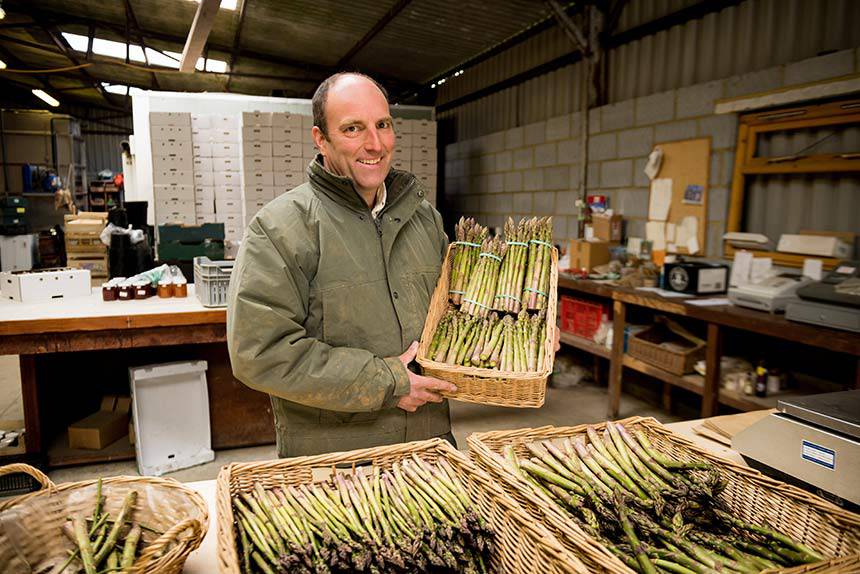With just three letters to its name, May manages to spell the start and end of many things.
With the election campaign, the football season and even the royal pregnancy all coming to their respective ends, the asparagus season is just building up steam.
Symbol of spring and ubiquitous side dish, asparagus is hard to miss this time of year.
For the eight brief weeks it’s in season, from the end of April to midsummer’s day, we go mad for it.
But where exactly does our love affair with this vegetable stem from?
At Broadwater Forest Lane, Groombridge, Birchden Farm’s Stephen Barnes gives an asparagus lesson.
“Asparagus was originally a Mediterranean shoreline plant,” he explained. “It likes salt, it likes sand.
“The Romans cherished it for its alleged medicinal properties. As their empire expanded, so did its popularity. They moved it around the world.”
In fact, the empire’s love of the plant was such that Roman emperors dispatched special ‘asparagus fleets’ to gather and transport it, and Augustus coined the idiom ‘velocius quam asparagi coquantur’ to indicate haste, which translates to ‘faster than asparagus can be cooked’.
Though its history stretches back into antiquity, asparagus has never been more popular than it is now.
“We’ve been doing this for 21 years,” said Stephen. “Demand is always increasing, year on year.
“About ten years ago the AGA (Asparagus Growers’ Association) had a big PR drive. There’s a lot more publicity now.
“There’s been a real attempt to appeal to the younger generation and to take away the expensive image asparagus had.”
The publicity has paid off. UK demand for asparagus outweighs supply, and not a single spear produced in this country is exported.
“There’s not enough to satisfy home demand”, said Stephen.
The demand Birchden Farm works to meet is very close to home indeed.
Stephen said: “We have 30 acres here, which produces 30 to 40 tonnes a year.
“We cut seven days a week so it’s always fresh. We sell it in our farm shop, and supply local restaurants, pubs and traders. It generally stays within a ten-mile radius.”
And why is demand so high?
“It’s a highly versatile plant,” Mr Barnes explained. “It doesn’t have to just be steamed and eaten with butter any more. You can stir fry it, barbecue it, roast it -the list is endless.
“And it’s one of the very few remaining plants that’s still truly seasonal. Eating asparagus is a tradition and an addiction. For the eight weeks of the year they can get it, people go mad for it, knowing there’s an end in sight.”
Helping Mr Barnes feed this healthy addiction are four asparagus cutters, two sorters, preparers and packagers, and one very able helper who sells it in the shop.
One or more of the cutters is out in the fields every day of the week, ensuring the asparagus on sale is always fresh. The harvest is then graded, sorted and packaged in the farm shop, a process on full view to visitors and customers.
On the Birchden grading line, every asparagus spear will fall into a certain category, depending on its thickness, straightness and beauty.
One way they aren’t divided here is by their sex. No female plants have made it this far.
The males are far more productive than the females and make up the vast majority of commercial asparagus crops.
And productive males aren’t the only strange thing about it.
Stephen said: “It’s an unusual plant. It’s highly temperature sensitive. When the soil’s hot, it shoots up. When it cools down it stops. If there’s a heatwave in May or June, we’ve got asparagus coming out of our ears.
“The weather’s very important. Our climate is cooler than continental Europe. Asparagus grows more slowly here and that makes for a more intense flavour.
“It’s this slow growth that makes ours taste so much better than imported asparagus”
With this great taste and the great demand it fuels, Stephen could be forgiven for wanting the lucrative asparagus season to last a little longer. But the idea of its following strawberries and other previously strictly seasonal goods to a state of near year-round availability, is not one he endorses.
He said: “I hope it won’t ever go that way. It’s certainly not something we’re going to do ourselves at any rate.”
So how to best enjoy asparagus for the short time possible?
Stephen advised: “Having said everyone should be versatile in their use of asparagus, I must confess I like it best steamed with butter!”
And how about the supposed aphrodisiac effect? Will a dinner date really melt with the butter?
A smiling Mr Barnes paused, then said, “Not in my experience!”








